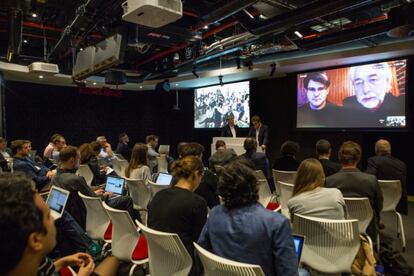Online media reinvents itself with a new universal and open format
Google and major newspapers, including EL PA?S, have created Accelerated Mobile Pages This new content standard will accelerate the delivery of information via mobile devices

The media have been living in a digital present for a long time, but now this present is also increasingly mobile. In the United States, people check the news more frequently on mobile devices than they do on computers.
That is why the websites of the world¡¯s major newspapers have agreed to upgrade in order to be more cellphone and tablet-friendly.
The new feature will let publishers, app programmers and users quickly load content on their mobile devices
The Google search engine will reward this initiative by positioning these sites higher up in its search results.
This is the basis of an agreement presented simultaneously in London, New York and other major cities on Wednesday by leading media outlets.
Google and more than 30 major international media outlets, including EL PA?S, have partnered to jointly create the first universal, open-source format that will allow content to be displayed and distributed much faster than to date.
The project goes by the name Accelerated Mobile Pages (AMP), and is still at the prototype stage. When completed, the new feature will let publishers, app programmers and users quickly load content on their mobile devices.
A new way of creating content, of distribution and advertising
New content. The new format aims to create a standard so that all media outlets can easily incorporate the enormous variety of content offered to its readers: photo galleries, maps, links to social networks¡ AMP is a format that will allow journalists to concentrate on content, and be confident that the visual experience of the user is assured.
Fast and global distribution. As well as speed, the new format is completely adaptable to any kind of device or platform. For Google, "this means that news or content produced in Spain can be distributed at the same time as in, for example, India." Speed is not just the product of a lightweight design, but also the distribution model: the content will be stored not just on the media outlet's servers, but also in Google's cache servers, which have a global reach. The search engine will quickly index the content with this format so that the reader can locate them immediately.
Advertising. This is so far the element that has yet to be fully defined in the new format, although some new ways of doing native advertising have been proposed. All of the sites that incorporate AMP will have the authority to choose their adverts. The format will be compatible with all the business models based on advertising or paywalls.
Tech companies such as Twitter and Google, online platforms like Pinterest, LinkedIn and WordPress.com, and publishers that include Vox, The New York Times, O Globo and the BBC (the full list of participants is available on the website ampproject.org) have confirmed that they will use the new standard for their content.
Besides EL PA?S, other media outlets who participated in developing the project with Google are Les Echos (France), FAZ (Germany), The Financial Times (Britain), The Guardian (Britain), NRC Media (The Netherlands), La Stampa (Italy) and Die Zeit (Germany).
Google has published a simulation on Google Search allowing users to test the loading speed of the new, optimized web pages.
Madhav Chinnappa, head of strategic partnerships at Google, began the Wednesday presentation by announcing that ¡°today is really the beginning of something. What we¡¯ve done is talk about what¡¯s happening in the news ecosystem. And one of the things that first emerged in our conversations with the media was the issue of mobile devices. We were all wondering, is this an opportunity or a challenge?¡±
For the Google representative, all of the media and technology coincides in two key words: speed and openness. ¡°We all need our pages to download a lot quicker, our users are asking for that.¡± From New York, the chief engineer of the AMP project, Dave Besbris, explains that they are working on the idea of the instantaneous. However, he makes clear that the format will not specifically benefit these pages in the search engine.
The developers of the project have created a number of webpages where readers can check the download speed of content: a general one, g.co/ampdemo, in which they suggest searching for terms such as Mars, Obama or Nobel Prize. EL PA?S has launched its own test page, g.co/ampdemo/es (the user should type in ¡°el pais¡± in this case).
The time in which it takes to download content has become a crucial element for readers when choosing one media outlet or another to find out what is happening. If a page takes time to load or doesn¡¯t appear correctly it can be frustrating for readers, while for publishers it is a lost opportunity to take care of its readers and obtain greater advertising income.
In contrast with other recent formats, such as Instant Articles launched by Facebook several months ago, or the more recent Apple News, AMP is an open-source software project. From today it will be available for any developer who wants to make use of it, including other media outlets who have not been involved in its creation. The specifications are available in Github, while some outlets, such as The Guardian, have already published simulations of how the news will be seen.

The fact that this is a joint standard with Google and some of the biggest international media outlets offers an advantage so that AMP can become the equivalent for the digital media of the PDF, used for portable documents; the JPEG for images; or FLAC for uncompressed music. Having been created based on HTML language, the biggest standard for webpages, content in AMP will not need any special program to be read.
The format is the first tangible result from the ambitious Digital News Initiative, an alliance of Google and major publishers to develop ¡°high quality journalism through technology and innovation,¡± according to the search giant. The initiative includes the creation by Google of a €150 million fund over three years ¡°for projects that show new ways of thinking in the practices of digital journalism,¡± a research and training program, and another dedicated to the development of new products. AMP was born from this program.
The project came from conversations between publishers and technology firms based on the urgent need to improve the ecosystem for mobile devices. The new format has been created from scratch by the product development teams at Google and the more than 30 media outlets involved. While it is a project generated by European media, other outlets have already signed up. It¡¯s the result of several months of work, albeit with room for improvements that will be announced shortly.
Simplify without homogenizing
Danny Bernstein, the director of product partnerships at Google, has explained the two elements that allow for a faster download speed. ¡°Firstly, we are simplifying all the HTML code that is behind current webpages, but with one requirement: for the reader, the pages have to maintain the appearance of each media outlet.¡±
In other words, the pages will be more homogenous in the invisible part ¨C the language in which they are written ¨C but they will maintain the variety of styles particular to each publisher.
The second key to speed is the hosting model of the content. The information will not just be stored on the servers of each media outlet, but rather the Google network will replicate them so that they can be distributed on any platform ¨C Google, Twitter, etc. ¨C and anywhere in the world. This system will allow, for example, for an update to a news story from one outlet will be reflected almost instantaneously in any other part of the world.
Readers of news ¨C the best readers
News readers are a desirable target for all agents working in the digital world, from news outlets to the social media to search engines like Google. A study by the digital consultancy Parsely shows that these users spend more time on news stories than on other types of content. News readers also check back more often for updates.
The project, which is still in its early stages, does not yet have a fixed launch date for the definitive version.
Media outlets such as The Guardian, the BBC and EL PA?S have presented their own prototypes. For the founding outlets of AMP, the focus of the project is very ambitious.
The project will allow for complete autonomy of publishers in terms of their content and their styles. For a spokesperson from the publishers, ¡°this autonomy is fundamental, because at the same time it allows for them to form part of a bigger platform, from an initiative in which so many important media outlets have taken part.¡±
The publishers cite another added advantage: it will be applicable for any technological platform. ¡°Building solutions for all of those that exist right now is hugely expensive,¡± they explain, adding that there ¡°is no media outlet capable of allowing itself to create its own solution in a sustainable manner.¡± A number of publishers have invited outlets that have not yet signed up to the initiative to ¡°work together¡± and to take into account the fact that ¡°there is no sustainable ecosystem that is capable of differentiating between the experience of the user and the integration of advertising. This project takes both aspects into account.¡±
Tu suscripci¨®n se est¨¢ usando en otro dispositivo
?Quieres a?adir otro usuario a tu suscripci¨®n?
Si contin¨²as leyendo en este dispositivo, no se podr¨¢ leer en el otro.
FlechaTu suscripci¨®n se est¨¢ usando en otro dispositivo y solo puedes acceder a EL PA?S desde un dispositivo a la vez.
Si quieres compartir tu cuenta, cambia tu suscripci¨®n a la modalidad Premium, as¨ª podr¨¢s a?adir otro usuario. Cada uno acceder¨¢ con su propia cuenta de email, lo que os permitir¨¢ personalizar vuestra experiencia en EL PA?S.
En el caso de no saber qui¨¦n est¨¢ usando tu cuenta, te recomendamos cambiar tu contrase?a aqu¨ª.
Si decides continuar compartiendo tu cuenta, este mensaje se mostrar¨¢ en tu dispositivo y en el de la otra persona que est¨¢ usando tu cuenta de forma indefinida, afectando a tu experiencia de lectura. Puedes consultar aqu¨ª los t¨¦rminos y condiciones de la suscripci¨®n digital.








































